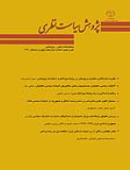رئالیسم اسلامی و درک روابط بین¬الملل مدرن
محورهای موضوعی : پژوهش سیاست نظری
1 -
کلید واژه: نگرش اسلامی به روابط بینالملل عقل در اسلام رئالیسم اسلامی روابط بینالملل مدرن,
چکیده مقاله :
در این نوشته تلاش شده تا به دو پرسش بنیادین دربارة نگرش اسلامی در روابط بینالملل پاسخ داده شود. نخست آنکه آیا از دید اسلام واقعیتی خارج از ذهن انسان وجود دارد و آیا می توان با عقل انسانی به فهم مقولات واقعی دست یافت؟ و دوم آنکه آیا روابط بین-الملل امری واقع و مستحدث است؟ در این صورت آیا شناخت عقلی از این مقوله می تواند مبنا و اساس فهم دینی از روابط بین الملل باشد؟ برای پاسخگویی به این پرسش در میان نحلههای مختلف اندیشۀ اسلامی و شیعی، از نگرش واقع گرایانۀ علامه طباطبایی و آیتالله مطهری استفاده کرده ایم که خودشان آن را رئالیسم خواندهاند. بدیهی است مفهوم رئالیسم در این نگرش با مفهوم رایج رئالیسم در نظریه های روابط بین الملل که اندیشمندانی چون مورگنتا و والتس آن را نمایندگی می کنند، متفاوت است. این مکتب فکری با گونه ای از نگرش فقهی عقل گرا همراه و هماهنگ است که برای فهم احکام فقهی نیز برای عقل حجیتی تام قائل است. بر این مبنا نشان داده شده است که در این نگرش نه تنها به وجود واقعیت و توانایی عقل برای درک آن اعتقاد دارند، بلکه درک عقلایی انسان از پدیده های مستحدث را مبنای اصلی شناخت دینی میدانند. در بخش پایانی این مقاله با مروری اجمالی بر بنیادهای روابط بین الملل مدرن نشان داده شده است که کلیت روابط بین الملل و بنیادهای آن مثل کشور- ملت ها، سازمانهای بین-المللی و اقتصاد بین الملل، اموری مستحدث اند که در دو قرن اخیر به وجود آمده و در زمان شارع وجود نداشتهاند و نگرش اسلامی منوط به فهم عقلایی و کارشناسی آنها در وضعیت نوین است.
In this article, it is tried to answer two fundamental questions about Islamic attitude in International Relations. First, is there any reality outside of Human mind from Islam view and can human intellect come to understand the real categories? Second is that, is International Relations a real and incontestable issue? If yes, can the intellectual knowledge and understanding of this category be the religious understanding base of International Relations? To answer these questions, among the available different faiths in Islamic and Shi’ism thought, we used the realistic attitude of Allame Tabatabaee and Ayatollah Motahari which they themselves call realism too. It is obvious that the concept of realism in their attitude is different with the current concept of realism among the theories of International Relations for which scientists like Morgenta and Walts are its deputies. This thinking school is concomitant and consistent with a kind of intellectualistic juristic attitude which considers an absolute argumentum for Intellect to understand juristic decrees. Then, It is showed that this attitude believes, not only in the existence of reality and the capability of intellect to comprehend it, but also they believe that the intellectual understanding of human from these incontestable phenomena is the main base for religious knowledge. In the last part of this article, along with a brief review of Modern International Relations foundations, it is showed that the entirety of International Relations and its foundations like nations-states, International organizations and International economy are incontestable issues which are developed in the last two decades and were not existed in lawgiver era and the Islamic attitude is dependent on their intellectual understanding and judgment in new condition.

